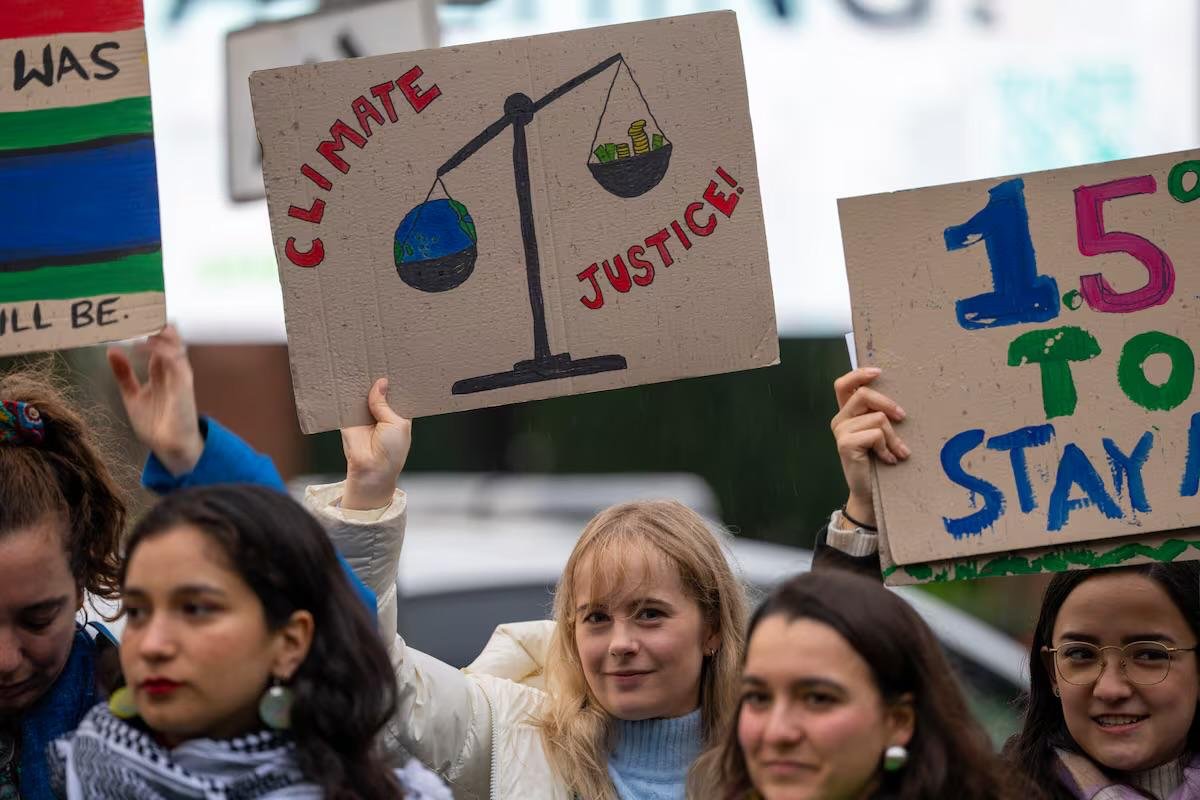Mexico Incorporates WYCJ’s Legal Framework on Intergenerational Equity at the ICJ
The principle of intergenerational equity—the idea that present generations owe a duty to future generations to preserve the environment and safeguard their rights—is a widely discussed concept in climate justice. However, its practical implications in international law remain vague. Recognizing this gap, the Latin American front of World’s Youth for Climate Justice (WYCJ), in collaboration with national and regional civil society, has been working to define actionable obligations for States. This effort recently culminated in a landmark moment at the International Court of Justice (ICJ), where Mexico explicitly incorporated these proposals into its written comments in the Court’s historic climate case.
Image credits: Greenpeace International
From Principle to Practice: Defining Intergenerational Equity at the World’s Highest Court
Since March 2023, the Latin American front of WYCJ focused on influencing the climate legal framework through structured legal inputs, particularly in the ICJ Advisory Opinion (ICJAO) proceedings on climate change. We drafted and submitted legal briefs to several governments, including Colombia, Chile, Costa Rica, and Mexico, emphasizing the need to recognize intergenerational equity as a fundamental legal principle. These briefs outlined specific obligations States must undertake to ensure that their climate policies today do not undermine the rights of future generations. Direct engagement with these governments also highlighted the importance of broader youth participation in the advisory proceedings.
Legal brief presented by WYCJ to Mexico’s Ministry of Foreign Affairs
Mexico’s Explicit Recognition
In preparation for the ICJAO proceedings, WYCJ and Nuestro Futuro A.C., presented a legal brief with the following key arguments on intergenerational equity:
Intergenerational Equity as a Cross-Cutting Issue in Policy Making: States must integrate intergenerational equity into climate policy, legislation, and planning while assessing the long-term human rights impacts on future generations.
Involving Children and Youth in Climate Decision-Making: States must ensure that youth, including Indigenous youth, have a central role in formulating and implementing climate policies, as they are closest in time to future generations and vital to fostering multigenerational thinking.
Highest Possible Climate Ambition: States have a duty to prevent and address the impacts of climate change on future generations by exhibiting the highest possible climate ambition. This includes adhering to the 1.5°C target of the Paris Agreement and fulfilling Nationally Determined Contributions, while ensuring the principle of 'common but differentiated responsibilities' does not justify inaction or regression.
Limiting Regressions in Environmental Protection: Regressions in climate change mitigation or adaptation measures must be limited and justified only after a thorough proportionality analysis, weighing their impacts on the human rights of future generations.
In its written comments to the ICJ, Mexico explicitly adopted these points, directly citing our brief and stating that, under the principle of intergenerational equity, States:
Must integrate intergenerational equity into climate policy, legislation, and planning of long-term human rights impacts on future generations.
Must ensure that youth, including Indigenous youth, play a central role in formulating and implementing climate policy.
Prevent and address environmental degradation and climate change impacts on future generations while acting as stewards of the planet.
Assess regressions in environmental protection through a proportionality analysis, considering principles of equality, intergenerational equity, cultural relevance, and non-discrimination.
Mexico’s intervention emphasised the role of youth organizations in shaping these arguments. The recognition and adoption of these proposals represent a pivotal moment in advancing the legal obligations surrounding intergenerational equity within international climate law.
Lessons Learned and Broader Impact
This achievement demonstrates the power of youth advocacy and collaborative networks in driving substantive change in international law. The success in Mexico builds on years of mobilization and advocacy by the Latin American front of WYCJ, including strategic partnerships with civil society organizations. The leadership of dedicated individuals, such as Mariana Campos Vega (Mexico), Deputy Front Convenor for Latin America, has been instrumental in spearheading these efforts.
As the ICJ continues to deliberate on its advisory opinion, the articulation of what intergenerational equity requires from States will serve as a testament to the hard work and dedication of youth worldwide that have tirelessly worked to bring climate change to the world’s top court. By working collectively, youth can continue to shape a more just and sustainable future for generations to come.


